Day 2: Anti-Racism & Decolonisation
by Jon Davison
On the second day we explored clowning from an anti-racist perspective and how to decolonise our artform.
Session 1 - Halima Habil – Clowns Without Borders Anti-Racist Training
Halima Habil shared the anti-racist training she has been developing for the last 2-3 years at Clowns Without Borders. As a response to the dangers of white saviourism in the charity sector (including clowns), Halima is part of an advisory board that produced an inclusion, diversity and decoloniality policy. They provide advice to CWB chapters on challenges, best practices and accountability.
The session guided us through exercises in self-reflection on:
- Our privilege
- Imagining others’ privilege/disadvantage
White privilege:
- No-one here can do it
- I can do it
- You need this
- I felt great when they laughed
- It’s a pity I can’t go back
Allyship
- Offer to work together
- Find people that can help
- Reference her
- Mention her name in conversations to others
- Recommend her
- Ask what she needs
- Ask what she struggles with
- Ask what she knows
Resources shared:
Me and White Supremacy https://g.co/kgs/Q8WPCD
Cohesion Collective Www.cohesioncollective.com
Session 2 - Fatina Cummings and Jon Davison - ‘Contested Workshop’
We decided to ‘play ourselves’, which meant:
Jon: white cis male, older than many present, author of books, clown teacher internationally – gets to speak and tell others what to do
Fatina: black cis woman, ‘new’ to performing, challenged by her white and black peers, often excluded by programmers, teachers, etc.
We had agreed on jointly presenting one of Jon’s exercises
After an introduction, Jon explained the phases of the exercise, where you can only perform your script when the audience are laughing. Shortly into this process, a participant challenged the fact that this seemed like just Jon giving a workshop. My (Jon) response was, and is, to note that this is ‘us playing our roles’.
Fatina then took the lead by describing some of the challenges she faces as a black performer and how she has sought to meet those challenges.
We then jointly presented the main phase, asking participants to take a recent news story relating to colonialism and to stage it. They then performed according to: only perform the script when we laugh.
Some performances revealed quite a lot of discomfort, about: refugees and racism (Ukraine and black refuges).
My own big learning point was around the group of 5 white participants who I and Fatina both coached during the process, who expressed firstly that they felt no connection to the news story (about a young black man killed during the previous weekend’s Notting Hill Carnival), but who felt so much (discomfort) when having to perform that they refused to perform (the only group who refused). Fatina’s reflections on this were very clear, about the privilege white people have to not feel discomfort. So, although black and white clowns have different discomforts, we can all play and clown those discomforts.
‘Colonialism is our script’
We decided to ‘play ourselves’, which meant:
Jon: white cis male, older than many present, author of books, clown teacher internationally – gets to speak and tell others what to do
Fatina: black cis woman, ‘new’ to performing, challenged by her white and black peers, often excluded by programmers, teachers, etc.
We had agreed on jointly presenting one of Jon’s exercises
After an introduction, Jon explained the phases of the exercise, where you can only perform your script when the audience are laughing. Shortly into this process, a participant challenged the fact that this seemed like just Jon giving a workshop. My (Jon) response was, and is, to note that this is ‘us playing our roles’.
Fatina then took the lead by describing some of the challenges she faces as a black performer and how she has sought to meet those challenges.
We then jointly presented the main phase, asking participants to take a recent news story relating to colonialism and to stage it. They then performed according to: only perform the script when we laugh.
Some performances revealed quite a lot of discomfort, about: refugees and racism (Ukraine and black refuges).
My own big learning point was around the group of 5 white participants who I and Fatina both coached during the process, who expressed firstly that they felt no connection to the news story (about a young black man killed during the previous weekend’s Notting Hill Carnival), but who felt so much (discomfort) when having to perform that they refused to perform (the only group who refused). Fatina’s reflections on this were very clear, about the privilege white people have to not feel discomfort. So, although black and white clowns have different discomforts, we can all play and clown those discomforts.
‘Colonialism is our script’
Session 3 - Open Space – discussing issues relating to decolonising clown and anti-racism
Groups formed to discuss some of the issues raised earlier, such as:
How do CWB behave when they travel to a different country/culture?
Racism in the clown workshop
What is the lineage of racist clown exercises?
Discomfort
There’s a reason we feel discomfort
Groups formed to discuss some of the issues raised earlier, such as:
How do CWB behave when they travel to a different country/culture?
- Holding space without taking space
- Research before travelling
- Listening before responding
Racism in the clown workshop
What is the lineage of racist clown exercises?
- Now do a Russian dancer
- Washing machine exercise
- Negative stereotypes
- Elements of culture out of context
- Asking where people are from
- Who can be vulnerable?
Discomfort
There’s a reason we feel discomfort
- Discomfort leads to growth
- It’s not about feeling guilty. Find out what it’s about if it makes you feel this way
- Graph with two axes: privilege and oppression. Use the graph as a basis for a poem or playwriting
- Discomfort through just walking into someone
- In clowning – ‘I’m just done’. Seeing someone relax … beautiful
- What inspires your work? Something’s up. The elephant in the room. Us running away from ourselves.
- You don’t create good work being safe
- How do we react to discomfort? Numbing out. Switching off. Digging into why we’re feeling what we’re feeling.
- Black people not being allowed onstage alone. Chocolat. Mr Bo Jangles. Buddie Bradley. Hidden histories. History of blackface
This online panel discussion was be moderated by Amrita Dhaliwal from the Idiot Workshop in Los Angeles. She posed some of the Clown Congress’s key questions to clown artists who are actively working on issues of social justice.
Panel guests: Jacqueline Russell, Barry Bilinsky
20 people attended online
Questions discussed:
- Who do you clown for? Who is your audience? Your community? Is there such a thing as a globalised clown (audience)?
- What does a decolonised clown landscape look like?

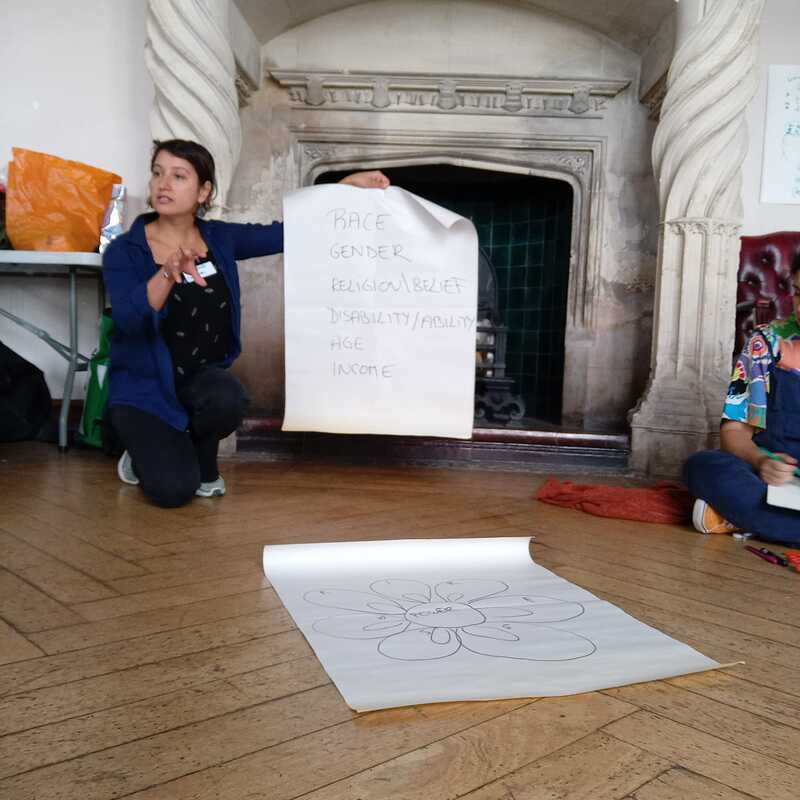
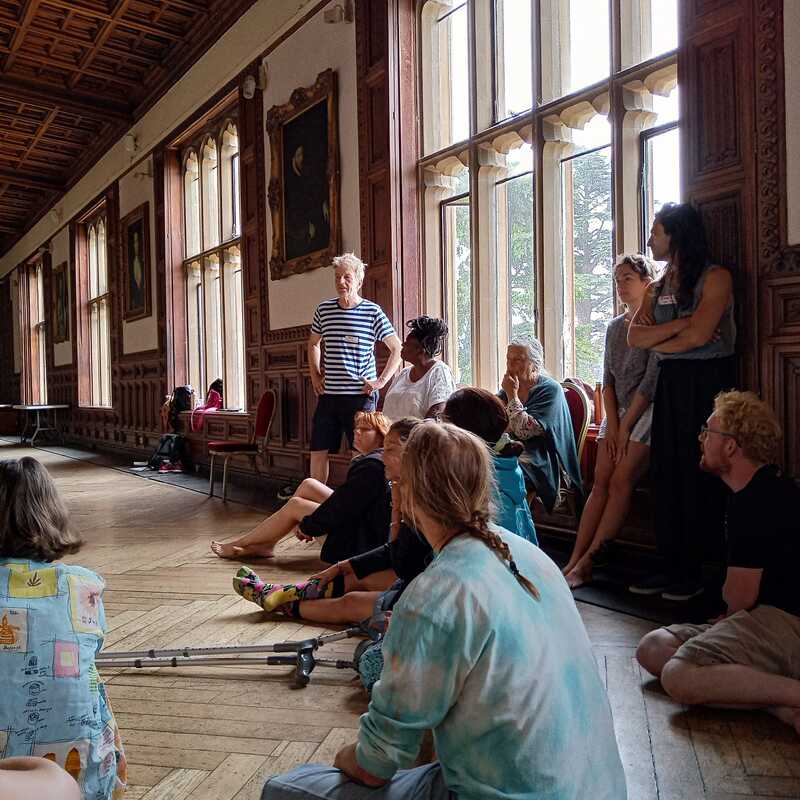

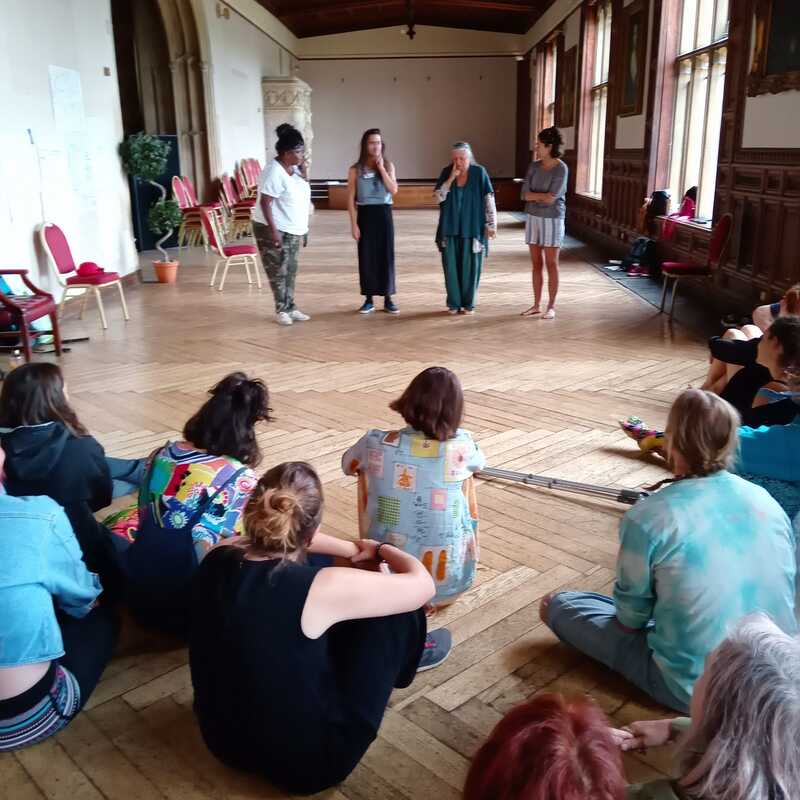
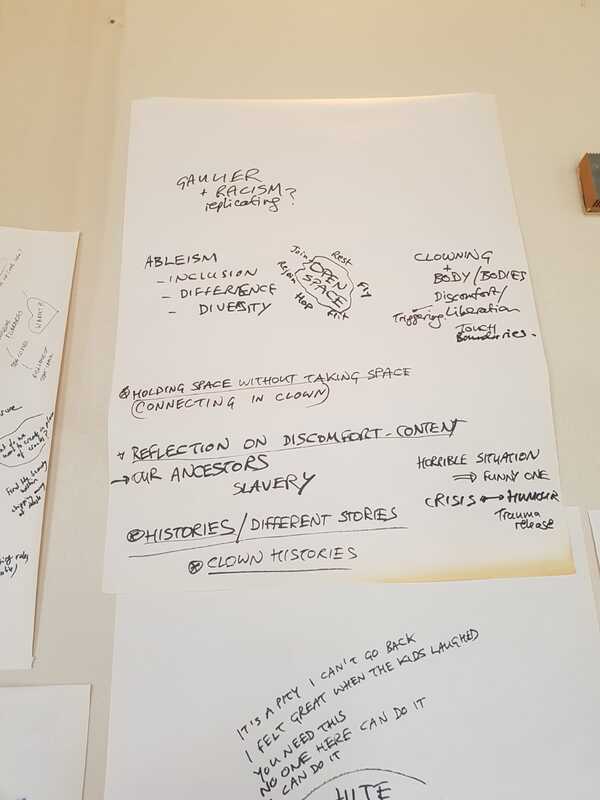
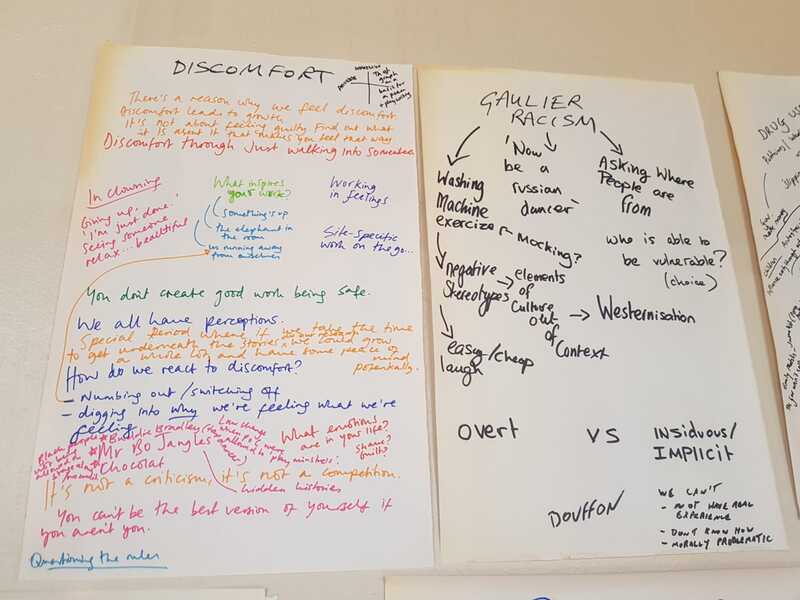
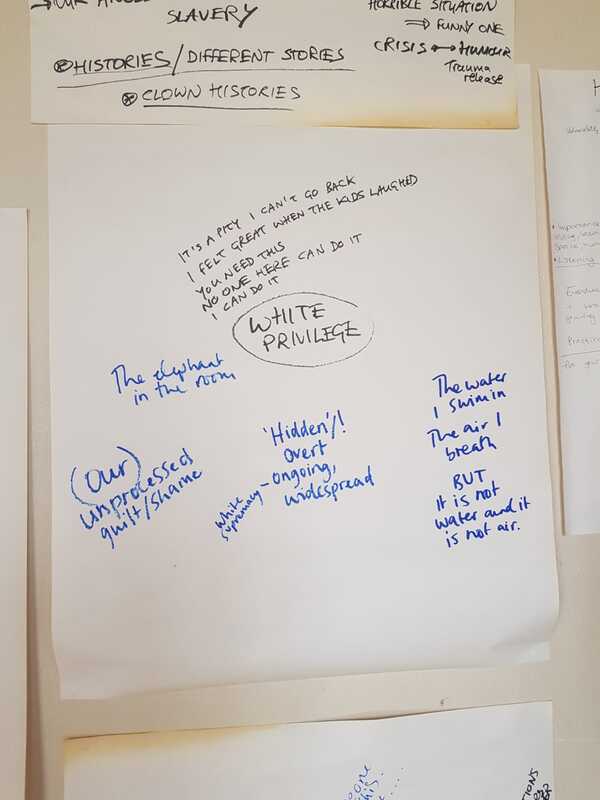
Comments
Post a Comment